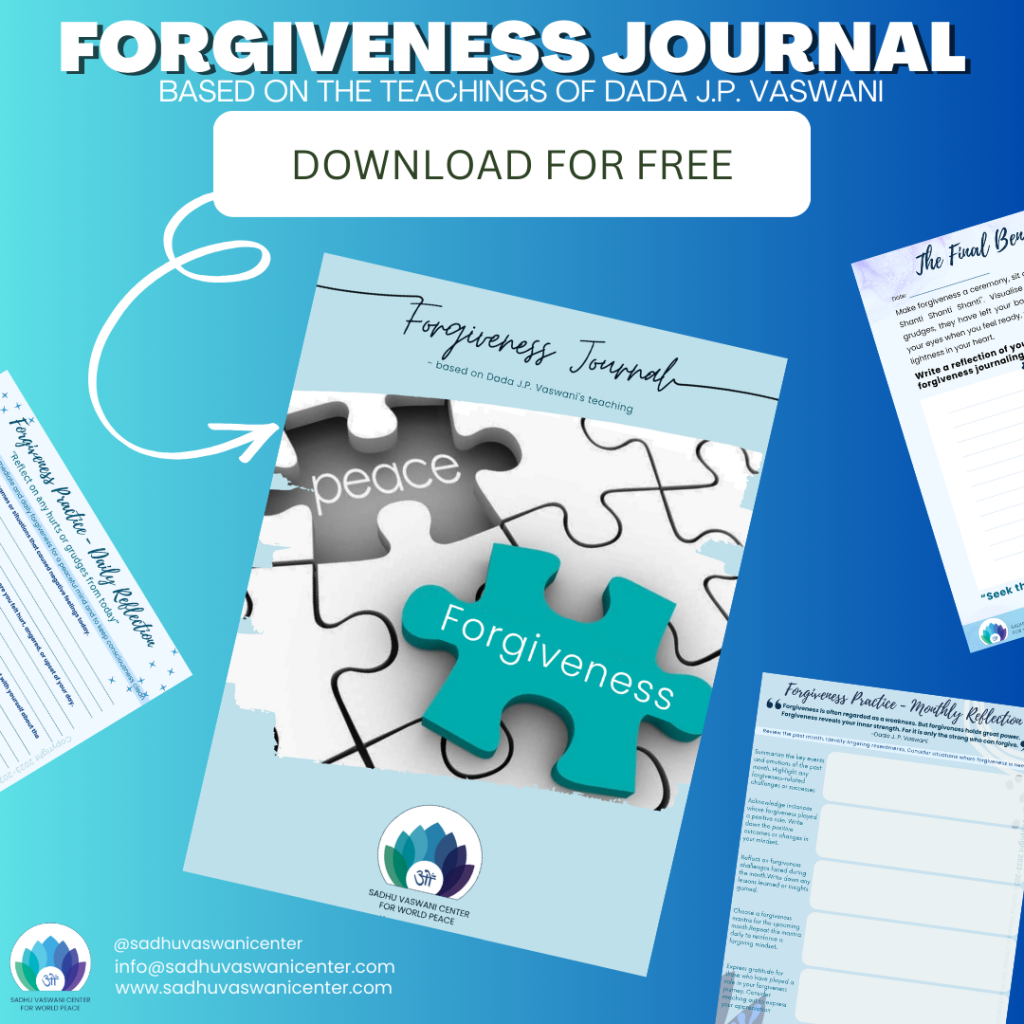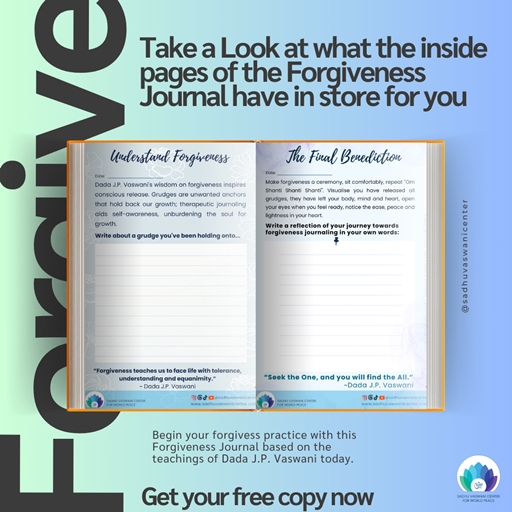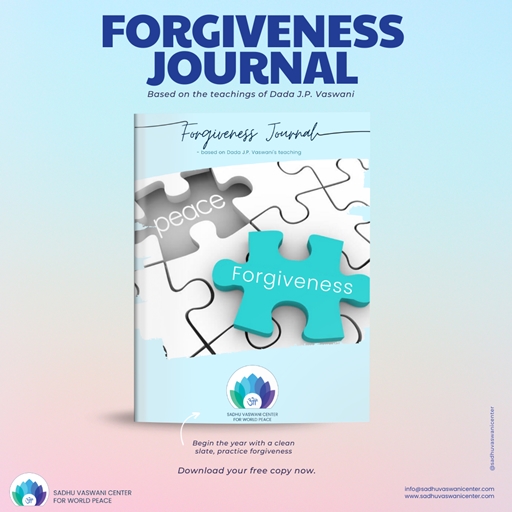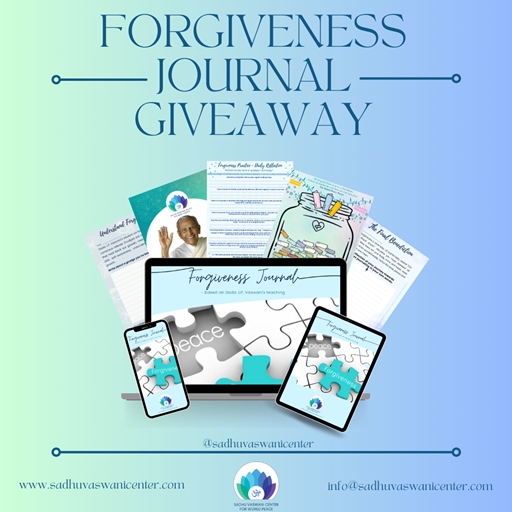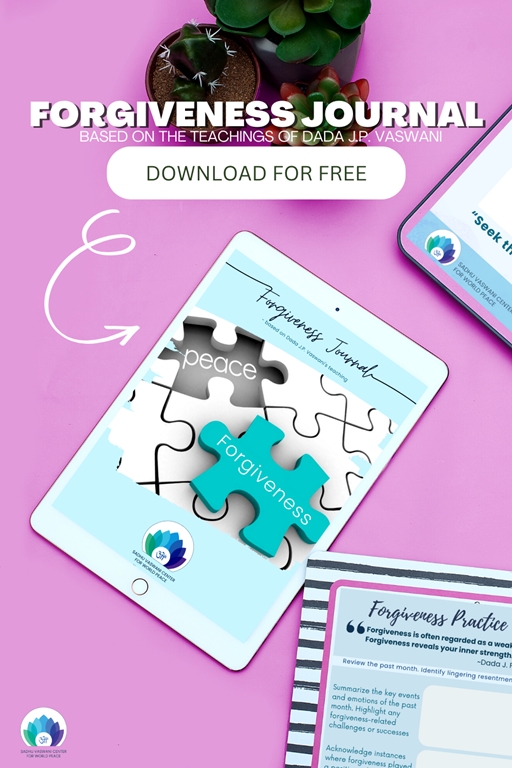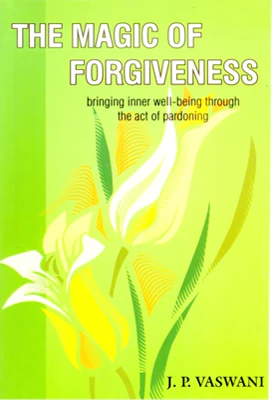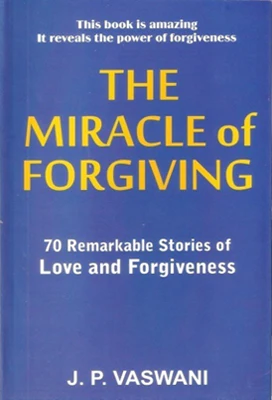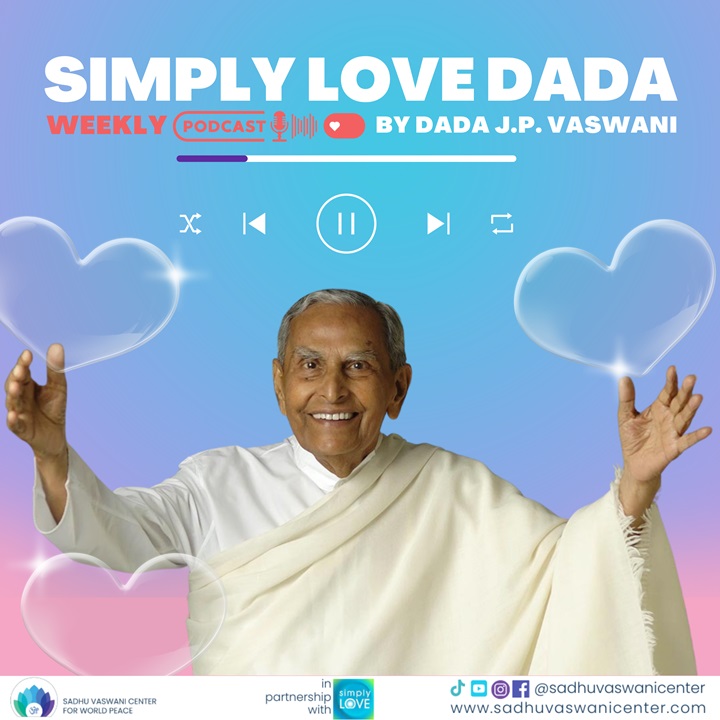About us
Forgive and Be Free! – Dada J.P. Vaswani
Download Your Copy of the Forgiveness Journal Based on the Teachings of Dada J.P. Vaswani
“Forgiveness is its own reward. It is the forgiver rather than the forgiven who receives the greater benefit.” – Dada JP Vaswani
Dada J.P. Vaswani teaches us how to apologize with grace, forgive with generosity, restore damaged relationships, overcome resentment and bitterness and above all, how to forget after we have forgiven someone.
What is forgiveness? Why should we forgive? How can forgiveness empower us, heal us, help us to bury the dead past and begin our lives anew? Dada J.P. Vaswani, whose knowledge of human nature is profound, but, at the same time, compassionate and non-judgmental, teaches us how to apologize with grace; how to forgive with generosity; how to restore damaged relationships; how to overcome resentment and bitterness; how to forgive ourselves when the need arises; and above all, how to forget after we have forgiven someone. Within the pages of this Forgiveness Journal you will find the means to master the art of Forgiveness as Dada J.P. Vaswani guides it.
It is difficult to imagine what life would be without the spirit of forgiveness. How true it is that, he who has not forgiven an enemy, has never yet tasted one of the most sublime joys of life. Let us forgive one another while there is yet time, for the day cometh when the opportunity to forgive will be taken away from us.
“We win by tenderness; we conquer by forgiveness”. In this journal, Dada J.P. Vaswani shows us how we may conquer ourselves – and the hearts of others.
Dada J.P. Vaswani Shares the Four Stages of Forgiveness
The Four Stages of Forgiveness
The first stage of forgiveness is hurt- Someone has wronged me, done something mean to me; someone has been unfair to me and I cannot forget it; I feel hurt. The hurt keeps on throbbing within me. It is here that we must remember that it is not I who feels hurt, but the ego.
A woman met a holy man and confessed that she had resentment in her heart against a prominent sister of the community. The holy man said to her, “Go to her immediately. Don’t try to justify or excuse yourself. Tell her that you have had an unkind thought about her. Be humble and ask for forgiveness.”
The woman said, “I can’t do that. I can’t forget the hurt she had inflicted on me.”
The woman was at the first stage – the stage of hurt. Those that are at this stage naturally hold grudges, not realizing that those who hold a grudge injure themselves more than the ones against whom the grudge is held.
Hatred and malice, like anger and worry, bring harm to the body, since they poison the blood. And they keep on increasing, for, “a grudge is the only thing that does not get better when it is nursed.”
Hurt leads to hate, which is the second stage. I cannot forget how much I have been hurt and so cannot send out thoughts of goodwill to my enemy. In some cases, I hate the person so much that I want him or her to suffer, as much as I am suffering.
Madam Chiang Kai-Shek hated the Japanese. Her mother was a pious woman who prayed often. Madam Chiang said to her, “Why don’t you pray to God that He may drown Japan in the waters of the ocean?”
Her mother, of course, said to her, “My child, how can I offer such an evil prayer?”
An artist once painted Hatred as an old man shriveled up, pale as death, clutching in his claws lighted torches and serpents, and cruelly tearing out his own heart with black, decayed teeth. Asked to explain the significance of the picture, the artist said, “Hatred is an old man because it is as ancient as mankind; pale because he who hates, torments himself and lives a tragic life; with claws because it is so unmerciful; with torches and serpents because it creates discord; and it tears out its heart because it is self-destructive.”
Hurt leads to hate. Then comes the third stage—healing. God’s grace descents on me and I begin to see the person who has hurt me in a new light. I begin to understand his or her difficulty. My memory is healed and I am free again.
A girl came to a holy man and said, “I know not why, but I am unable to sit in silence and pray or meditate. I feel restless. I used to be so happy.”
The holy man asked, “Why do you think is it so?”
The girl answered, “I think it has something to do with one whom, at one time, I regarded as a friend. But she was very cruel to me, and I said that I would never forgive her, never talk to her. I am sorry I said it, but since then there has been no peace in my heart. What shall I do?”
The holy man said, “It is better to break a bad vow than to keep it. Go to her and seek her forgiveness.”
The next morning, she went to her friend and confessed her uncharitable attitude and asked her forgiveness.
The one whose forgiveness was sought burst into tears. She said, “You have come to ask for forgiveness. It is I who should be asking for forgiveness, for I am ashamed of my wrong attitude.”
The two friends were reconciled.
After healing comes the fourth stage of coming together. I am anxious to make friends with the person who hurt me; I invite him into my life. I share my love with him and we both move to a new and healed relationship.
Conclusion
Forgiveness isn’t reserved only for the saints and sages. It is not a feat of supernatural power. It is just about letting go of the hurtful past, once and for all. It is a way of moving on. Forgiveness asks you to see things differently, look at life from a new perspective. It is the realization that we cannot stay bitter and angry for the rest of our lives.
Forgiveness and love are really two sides of the same coin. And love, as you know, is the strongest force in the world.
Dada urges you to forgive for the sake of good health, peace of mind and true happiness
Dada J.P. Vaswani Provides Some Great Practical Tips That Can Be Used in the Process of Forgiveness:
Forgive – Every night empty your mind of the little hurts and grudges you have accumulated during the day. Every night as you retire to bed, think of the people who have wronged you through the day—wronged you, harmed you, cheated you or taken undue advantage of you. Think of them all then call out their names one by one and forgive them verbally. Actually say, Mr. XYZ, I forgive you, I forgive you, I forgive you. Dada adds, “Do not wait for the wrongdoer to come and ask for your forgiveness. Forgive even before forgiveness is asked. Until we begin to practice forgiveness, we will be haunted by the bitterness of the past and the past will continue to repeat itself.”
Empathize – Get an empty chair in front of you. Now imagine, the person you’re angry with or the person you need to forgive sitting on the chair. Feel your emotions towards that person. Hurt, anger, hatred, bitterness, feel all the emotions towards that person. Now, swap your position, sit on the other chair and imagine yourself as that person. Contemplate how that person might feel after hearing about the deep pain or hurt or anger. You will realize that the person must have felt remorseful, disappointed about his actions upon hearing the painful emotions. After this, go back to your original position and respond to that other person. You will realize this time that the anger or bitterness has shifted and you will feel compassion for that person.
Let go – Make a mental list of all the people in your life you’re holding a grudge against, close your eyes, and visualize a negative cord of energy attaching you to that person. Next take a deep breath and see that cord being cut with both of you gently floating apart, releasing the negative energetic bind. Continue to do this until you feel you have released the experience. If you’re still struggling, write an unedited letter to the offender expressing all of your feelings. Read the letter to a trusted friend or simply aloud and then burn it someplace safe. Visualize the energetic cord being cut while you’re burning the letter and silently repeat, I am FREE. Repeat the releasing process as needed and watch what shifts in your life.
The goal is to let go and by letting go we become more loving towards ourselves and more loving and kind in our daily interactions with one another. As Mahatma Gandhi said, “The weak can never forgive, forgiveness is the attribute of the strong.” A simple yet powerful statement. By making the choice to forgive the wrong that is done to you takes courage, takes strength and takes perseverance. It’s choosing to free ourselves from the chains that bind us down and live free from fear.
Cultivate the Spirit of Forgiveness
Forgiveness is therapeutic
Forgiveness is liberating
Forgiveness requires effort
Forgiving yourself is an important step
Forgiveness is a daily practice
Cultivate the Spirit of Forgiveness
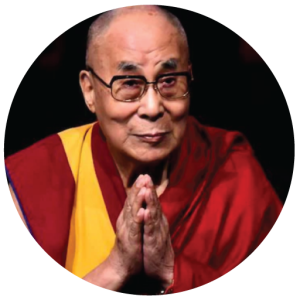
H H DALAI LAMA
Spiritual Leader

KRISHNA DAS
Vocalist, Grammy Award Nominee
Forgiveness is the best way to clean our hearts of anger, hatred, selfishness, and greed.

AAMIR KHAN
Actor

SHANKAR MAHADEVAN
Music Composer
Let us forgive all, our hurts big or small. let us forgive, let us love all for God forgives us and loves us all.
Get Dada's Books on Forgiveness
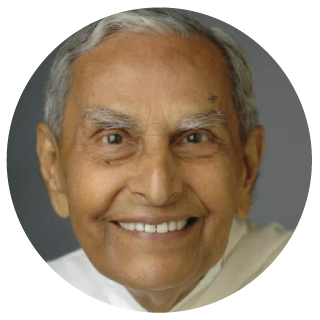
About Dada J.P. Vaswani
About The Moment Of Calm
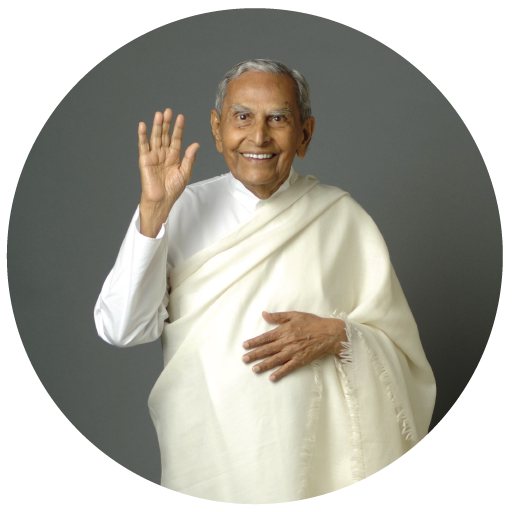
FAQS
Embarking on a forgiveness journal can be a transformative experience, offering you the opportunity to heal emotionally and grow spiritually. Here are some simple steps to help you begin your journey towards forgiveness and inner peace.
1. Download your complimentary copy of the Forgiveness Journal from this page
2. Start by meditating with Dada’s guidance.
3. Set an intention to be able to forgive.
4. Follow the page-by-page guidance outlined in this step-by-step Forgiveness journal
5. Write notes and whatever comes up, have an additional writing pad if needed along the way.
6. Remember to be easy with yourself and do it at your own pace yet don’t procrastinate.
7. Breathe, drink water, replenish your body, and pat yourself for every little progress that you make.
Journaling can be a transformative tool in the journey towards forgiveness, providing a safe space for emotional healing and spiritual growth. By engaging in the act of writing, you can explore your thoughts, feelings, and experiences, allowing you to gain a deeper understanding of yourself and your relationship with others.
Here are some ways journaling helps with forgiveness:
- Self-awareness: Journaling allows you to delve into your emotions and thought patterns, fostering self-awareness and a better understanding of the root causes of any resentment or pain.
- Emotional release: Writing provides an opportunity to express your feelings, helping you release pent-up emotions and alleviate the burden of holding onto past hurts.
- Perspective: Through journaling, you can gain new perspectives on the situations and relationships that challenge your ability to forgive, allowing you to see things from a different angle and opening up the possibility of forgiveness.
- Healing: As you process your emotions and thoughts through writing, you begin to heal from the pain and hurt associated with past experiences, creating space for forgiveness and emotional growth.
- Spiritual connection: Journaling about forgiveness can deepen your relationship with God, as you seek His guidance, wisdom, and strength in your journey towards emotional healing.
- Empathy and compassion: By reflecting on your own experiences and emotions, journaling can help you develop greater empathy and compassion for yourself and others, making forgiveness a more attainable goal.


